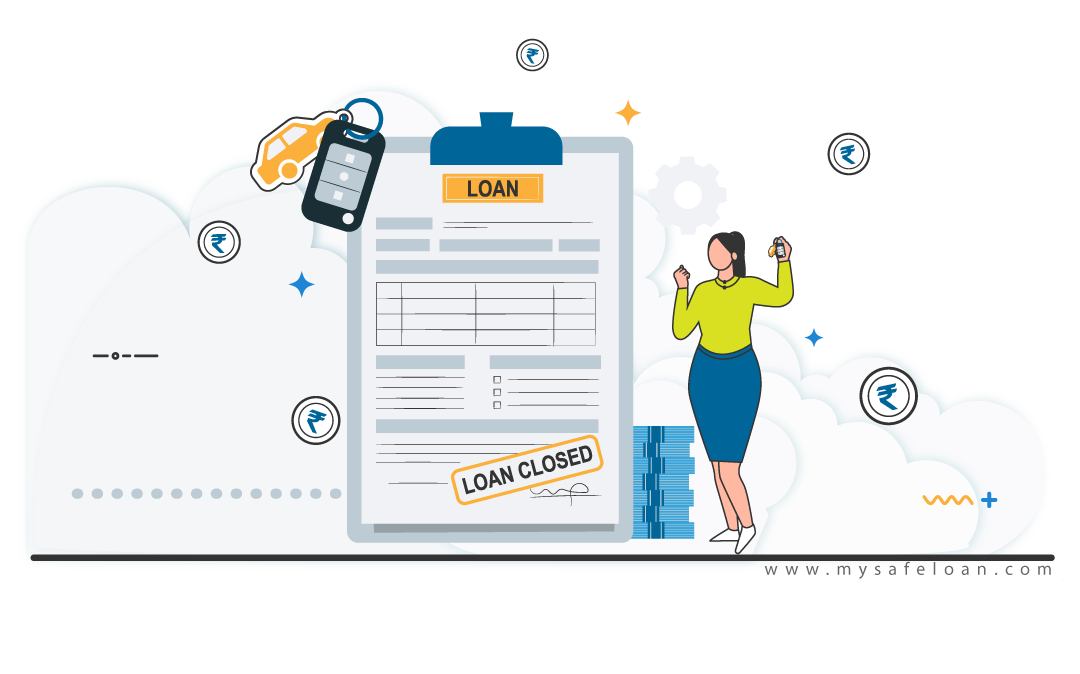Introduction
Loan foreclosure is one of the most effective ways to eliminate the debt burden from your shoulders. In any personal loan, borrowers usually pay a chunk of interest with principal EMIs (Equated Money Instalments). However, borrowers can now use extra funds and foreclose the loan to save interest expenses rather than settling the loan in the given tenure, which you’d usually do. A handy guide of frequently asked questions is provided below to assist the ones looking to foreclose personal loans.
What is foreclosure?
In a nutshell, foreclosing is closing the personal loan debt and settling the account in one payment before its term ends. After mutually deciding the term period for debt and coming into a lender-borrower relationship, the borrower gets obliged to pay loan interest with every EMI. In case they settle the remaining debt in one payment, or before the term ends, the foreclosure facility advances them to save some interest charges or get out of debt burden.
Moreover, the interest levied on any debt is directly or indirectly proportional to loan tenure and the number of EMIs. The longer the term, the higher the interest charges. It is advisable to read the clauses & benefits related to foreclosure before borrowing a loan, as the lender can avoid giving benefits for foreclosure in the end.
Some Ideal benefits of doing foreclosure of personal loan are as follows:
- Interest savings: The primary motive behind settling a loan in foreclosure rather than finalized tenure is to save interest expenses only. However, it is good to check to calculate whether it is ending up in a profit or not, as lenders charge a fee to settle the loan in foreclosure.
- Debt decreases: Even if the borrower does not get any interest savings from foreclosure, clearing the loan will remove liability and ease the debt burden. The borrower will get free from debt earlier than expected.
- CIBIL score: If the bank (lender) updates foreclosure settlement properly and timely, the borrower can see an increase in CIBIL score. It gets easier to get more personal loan support in the future.
Are there any foreclosure and part payment charges on a personal loan?
Yes, almost all lenders keep conditions for foreclosure or part payment transactions to cover the profits they’ll lose. A borrower has to clear all unpaid charges, ongoing month’s EMI, and foreclosing charges while applying to foreclose a loan. Most of the time, lenders ask for 2% to 7% of the remaining principal as fees alongside taxes to settle in foreclosure. Moreover, charges differ from lender to lender and loan opportunities with zero foreclosure charges are also in the market.
It is better to add clauses regarding foreclosure in loan documentation beforehand. However, if the borrower and lender forget to add legal clauses in documentation, a borrower can try to negotiate and take benefits.
How do I foreclose my personal loan? Will there be any charges for the foreclosure?
For this query, refer to the terms and conditions related to foreclosure in loan documentation. If foreclosure is allowed, the borrower has to submit some documents and file a foreclosure application to the lender. In most cases, a borrower can only foreclose their personal loan after completing a minimum period of 12 months. In addition, numerous banks also ask for a notice period of 30 days before foreclosure.
When discussing prices, lenders usually ask for foreclosure fees in addition to the remaining loan sum. These personal loan foreclosure fees are assessed to make up for the interest missed due to the borrower’s choice to pay off all past due amounts at once. If there are no legal clauses in the documentation, one can try to negotiate interest charges for the remaining months. However, it is crucial to calculate all expenses before foreclosing on a personal loan to determine whether it would benefit or cost more.
You must obtain a NOC (No Objection Certificate) from the lending institution in the end. It works as a verification stating all outstanding debts and charges are settled, and the loan has been foreclosed. Additionally, this guarantees that the lender has lost all legal claims to the provided documents.
How long does foreclosure take?
A borrower is restricted from applying for foreclosure before completing a minimum tenure which is mentioned in clauses. You can raise a foreclosure application immediately after finishing the minimum period. Usually, borrowers cannot foreclose loans in the first year of the term.
In some cases, the banks could additionally need you to provide a 30-day notice of foreclosure. Apart from this, there are chances lenders may also not agree to settle in foreclosure as it decreases the expected interest profits, and borrowers cannot do anything if legal clauses are documented for the same.
What documents are required in foreclosure?
Mostly, lenders ask for all personal loan documents and ID cards for paperwork to validate foreclosure. Some documents that banks can commonly ask for are as follows:
- Records of a loan deal.
- Receipt or bank statement of last EMI payment.
- Valid documents with photo identity, such as PAN or driving license.
Note: After settling the loan in foreclosure, the borrower should also ask for a No Object Certificate from the lender to close the account and cut all obligations.
Bottom Line:
To recall, loan foreclosing settles the remaining principal of a personal loan with one payment before the term ends. Borrowers get benefits if they can foreclose loans, the biggest of which is a cut in the debt burden or interest expenses. My safe Loan provides this opportunity to foreclose your loans at an affordable percentage within a stipulated time frame. To avail of this facility, contact us, and we’d be happy to assist you.

